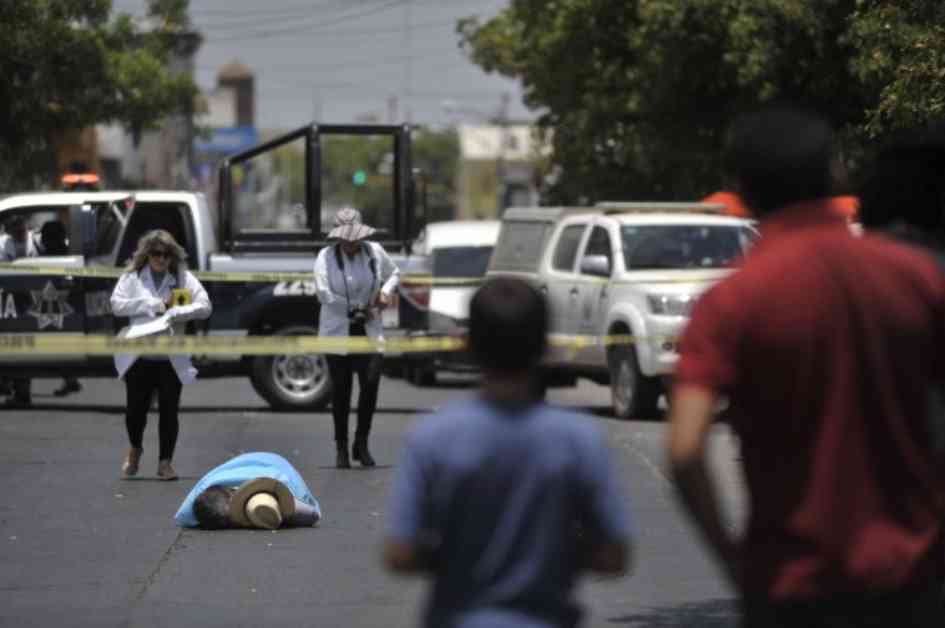Peacebuilding Efforts in a Mexican Cartel Conflict Area: Border Report Update
In the midst of escalating violence between two factions of the Sinaloa cartel in Culiacan, Sinaloa, Everard Meade, a peacebuilding expert, finds himself uncertain about his return to the conflict-ridden region. Meade, who launched Proceso Pacífico in 2015 in Culiacan, has been dedicated to promoting peace and stability in the area for nearly a decade. However, the recent power struggle within the cartel, led by the sons of co-founders Joaquin “El Chapo” Guzman and Ismael “El Mayo” Zambada, has plunged the city into chaos, resulting in at least 40 deaths as of Thursday.
Describing the situation in Culiacan as akin to a war zone, Meade highlighted the blockade of roads, torching of vehicles, closure of schools, and the heavy presence of soldiers patrolling the streets. The constant sound of helicopters overhead adds to the atmosphere of fear and uncertainty that grips the city. Amidst this turmoil, Meade’s organization, Proceso Pacífico, aims to identify and assist those most impacted by cartel violence, whether as direct victims or through their connections to crime-related incidents.
Efforts Towards Peacebuilding
On a recent episode of Border Report Live, Meade shed light on the diverse strategies employed by Proceso Pacífico to address the root causes of violence in Culiacan. Emphasizing a community-centered approach, Meade emphasized the importance of engaging local residents in finding solutions tailored to their unique circumstances. By mobilizing entire communities and empowering individuals to confront crime within their neighborhoods, Proceso Pacífico seeks to catalyze a new generation of effective responses to the pervasive issue of violence.
Meade’s vast experience in violence, migration, and peace studies, coupled with his academic background in Latin American history, has equipped him to navigate the complex political landscape of Mexico’s cartel conflicts. Through Proceso Pacífico, he has pioneered innovative programs that require participants to collect testimonies from those impacted by violence, develop strategies for social reintegration, and foster a culture of resilience against criminal elements. Meade’s proactive stance on addressing violence head-on has garnered recognition and support from local communities seeking lasting peace.
Challenges and Resilience
Despite the inherent risks associated with operating in cartel-controlled territories, Meade remains undeterred in his commitment to peacebuilding. Acknowledging the fear and uncertainty that accompany interactions with individuals tied to organized crime, he maintains that the transformative impact of Proceso Pacífico’s work outweighs the dangers. By fostering dialogue, collaboration, and grassroots initiatives, Meade and his team have managed to establish a network of support that transcends traditional boundaries and fosters a sense of unity among diverse stakeholders.
As the director of Proceso Pacífico, Meade’s influence extends beyond the borders of Culiacan, reaching cities along the West Coast, such as Tijuana, where similar peacebuilding efforts are underway. With projects also in the United States and Colombia, Meade’s vision for a more peaceful and secure future resonates across international borders, inspiring hope and resilience in communities affected by violence and conflict.
In conclusion, Everard Meade’s tireless dedication to peacebuilding in the face of cartel violence serves as a beacon of hope in a region plagued by chaos and instability. Through Proceso Pacífico’s innovative programs and community-centered approach, Meade continues to empower individuals to reclaim their agency and work towards a more peaceful coexistence. As the violence in Culiacan persists, Meade’s unwavering commitment to promoting dialogue, reconciliation, and social transformation offers a glimmer of hope amidst the darkness of cartel conflict.

